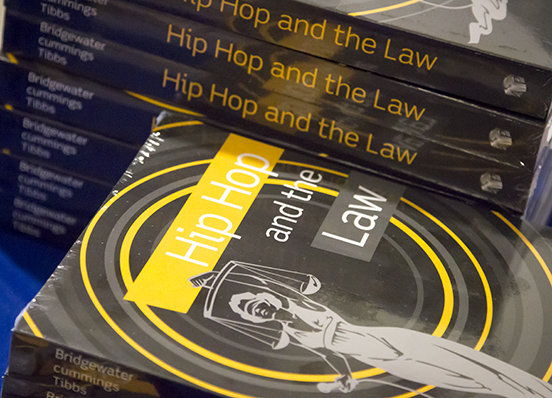Students, scholars and members of the Drexel community gathered at the law school on Sept. 8 for a discussion of Professor Donald F. Tibbs' new book examining the varied but undeniable connections between hip hop and the law.
"Hip Hop and the Law" complements the work of Tibbs' and co-editor, Indiana Tech Professor andré douglas pond cummings', course and lecture series of the same name. The book features a "bottom-up critique" of the myriad ways that hip hop music and culture intersect with the law and legal injustices, from intellectual property law to mass incarceration. The late Professor Pamela Bridgewater also co-edited the book.
Tibbs noted that hip hop "offers a real and honest critique of the criminal justice system" that is rarely expressed as potently elsewhere. To that end, in the book, Tibbs and cummings try to articulate that hip hop is not simply a musical genre but a cultural movement and musical anthology that captures a history of hyper-policing, wrongful imprisonment and "state sponsored violence" against blacks.
Tibbs created the lecture series and book as a scholarly forum for exploring recurring themes of injustice, violence, unjust policing and false imprisonment expressed by hip hop's greatest artists and how those themes connect to our legal justice system. For cummings, inspiration came from recognizing hip hop's ability to connect with young black youth by articulating the hyper-policing and legal injustice they actually suffered on a day-to-day basis, some of which cummings witnessed himself as a inner city youth volunteer in Chicago.

The book itself also embodies the spirit of hip hop, Tibbs said. "Hip Hop means to change conventions or conventional notions of wisdom," Tibbs added. The books' compilation of essays cements a place in the greater legal scholarly landscape to gather intellectual critiques of hip hop and the law, something that had not taken seriously until now, Tibbs claimed. In this regard, Tibbs thanked the law school, particularly Deans Daniel Filler and Roger Dennis for supporting the innovative course and lecture series that inspired the greater scholarly community to reconsider hip hop's connection to the law.
The volume, published by Carolina Academic Press, features essays by scholars including Bridgewater, who was a law professor at American University's Washington College of Law.